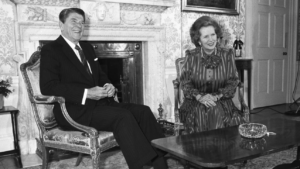Home » Commentary » Opinion » Is Josh Frydenberg so wrong to invoke Thatcher and Reagan?
· Sydney Morning Herald
 What is it about Margaret Thatcher and Ronald Reagan that aggravates many readers? When Josh Frydenberg said he takes inspiration from conservative icons, such as the Iron Lady and The Great Communicator (as well as John Howard and Peter Costello), the Twitter mob shrieked. “A political provocation,” letters to the editor warned.
What is it about Margaret Thatcher and Ronald Reagan that aggravates many readers? When Josh Frydenberg said he takes inspiration from conservative icons, such as the Iron Lady and The Great Communicator (as well as John Howard and Peter Costello), the Twitter mob shrieked. “A political provocation,” letters to the editor warned.
Leading Labor figures – from the parliamentary caucus to the trade unions – charged that a Thatcher-style reform agenda would inflict devastation on Australia. Esteemed columnist Ross Gittins scoffed at the Treasurer in these pages.
The strange thing is that the remarks that induced this hostile response were very measured. All Frydenberg told the ABC’s David Speers was that, just as Thatcher and Reagan stimulated the declining British and US economies in the 1980s, the Coalition wants to embrace a supply-side growth agenda to rescue Australia from the COVID crisis.
The Treasurer is right: from the Keynesian mindset that led to stagflation and turmoil in the 1970s, Britain and the US moved to an era of sounder policy and more durable prosperity.
Start with Thatcher. The British Labour government that she defeated in 1979 left a heavily subsidised economy in ruins: this was the “winter of discontent”. A top rate of income tax of 83 per cent left almost no incentive for innovation, investment or enterprise.
All that changed in the 1980s. Thatcher slashed marginal income tax rates to liberate enterprise, privatised public housing so the poor could own their own homes, sold off state assets so they could be properly and profitably managed and, above all, embraced labour reforms that empowered members and defeated militant leaders. The result: dramatically slashed working days lost to strikes and British prosperity continued until the global financial crisis in 2008.
If her reform agenda had not been attempted, Britain would now be worse off even than Italy, and could well have gone down the Venezuelan route. As long-time critic and journalist Max Hastings has acknowledged: “It was her achievement to halt a national economic and industrial decline that had seemed irreversible.”
Then there’s Reagan. When he took power in 1981, Newsweek observed that he “inherits the most dangerous economic crisis since Franklin Roosevelt took office” in 1933. Together with Paul Volker’s Federal Reserve, Reagan slayed the inflation dragon, kick-started the economy and set the scene for what Wall Street Journal editor Robert Bartley called “seven fat years” – then the longest peacetime expansion in American history.
True, Reagan and Thatcher failed to rein in spending. Recessions marked their early years, too, though they resulted from tighter monetary policy to break the back of inflation.
If Reagan and Thatcher were such disasters, as Australia’s critics contend, why then did Bill Clinton and Tony Blair embrace the new economic consensus of enterprise, low taxes and market economics? The New Democrats and New Labour were the political offspring of Reagan and Thatcher.
Bob Hawke, Labor’s most successful leader who did more to deregulate the Australian economy than any other prime minister, once said he “admired” the leadership of Thatcher and Reagan. As he put it in 1989: “I think that when the history books are written, President Reagan will go down as one of the great presidents of the United States.”
The hostility of Frydenberg’s critics leaves one wondering whether his Insiders remarks have touched the exposed nerve of a new economic nationalism and even socialism in Australia. If so, it is a disturbing state of affairs.
There is no economy in history that has benefited from socialism. All economies that have enjoyed sustained economic growth and improved living standards have done so through free trade and market reforms, not higher regulation and taxation.
If people want public health, education, welfare, infrastructure, defence and so on, the revenues to support them will come only from the growth of private enterprise. The more business succeeds, the more the tax receipts flow into the Commonwealth treasury. No nation has taxed itself to full employment!
Of course, the COVID crisis is not akin to the dire circumstances of the late 1970s and early 1980s. Economic reform is a tough sell during a time of rising unemployment. However, the Treasurer i–s right to support supply-side incentives to increase the economy’s productive capacity once the pandemic passes. Thatcher and Reagan would say Amen to that.
Is Josh Frydenberg so wrong to invoke Thatcher and Reagan?